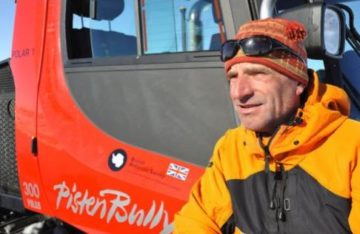Marking Zero Discrimination Day
1 March, 2022 Diversity in UK Polar Science
Simon Garrod is the Director of BAS Operations and Engineering. In our latest blog, Simon reflects on the UN initiative, Zero Discrimination Day and on the changes regarding inclusion and discrimination that have occurred since he started working in the polar environment nearly thirty years ago.
I feel hugely privileged that I have had such an incredible variety of experiences in the polar environment. Wintering in the Antarctic, seeing all the incredible scenery and wildlife, supporting remote fieldwork, living on the sea ice in the Arctic for several months, standing on the highest peak in the Antarctic, developing new capabilities at BAS and helping to facilitate our polar science that educates and informs policy makers and the public. I mention the above experiences and my good fortune to make a point. Whilst you make your own opportunities in life, the system also needs to be able to offer these opportunities.
My lucky break came when I got my first job with BAS as a wintering field guide at Rothera Research station, and the rest has followed on from this. Although it does not seem that long ago, that lucky break would not have been available to all. It seems incredible that less than thirty years ago, the criteria for wintering in the Antarctic with BAS meant that it was only open to single people under thirty-five. Fortunately, we have travelled some distance from this point in time, but it is worth considering all those denied my opportunities and how such discrimination could exist.

If we had a time machine and travelled back thirty years from the present to when I started, the inequalities would be obvious, but clearly it was not obvious to some at that time (although many were fighting to change this). I often like to ask myself the following question – imagine if we could fast forward to 2050 and travel back to 2022, would some of our current attitudes and practices, shock us?
I appreciate that you don’t actually need a time machine to observe the current inequalities and discrimination that exists in the world around us, but my point is to try and look with fresh eyes rather than accepting old norms and biases. I do believe that we are trying to do this, that we have the power to improve and influence, and that there is a real desire and will to create a better and fairer world within our community. This will not happen overnight but we can all play our part, whether it is taking a more innovative approach to recruitment, calling out unacceptable behaviours, creating an inclusive culture and safe environment across all our operations, listening and learning from those who have suffered from discrimination and finding new ways of working that enables greater participation in remote science.
We are on a journey and there is still a long way to go, but we can all make a difference if we take a zero tolerance approach to discrimination, treat everyone with the respect they deserve and take a proactive approach to creating a better, fairer and safer environment for all.